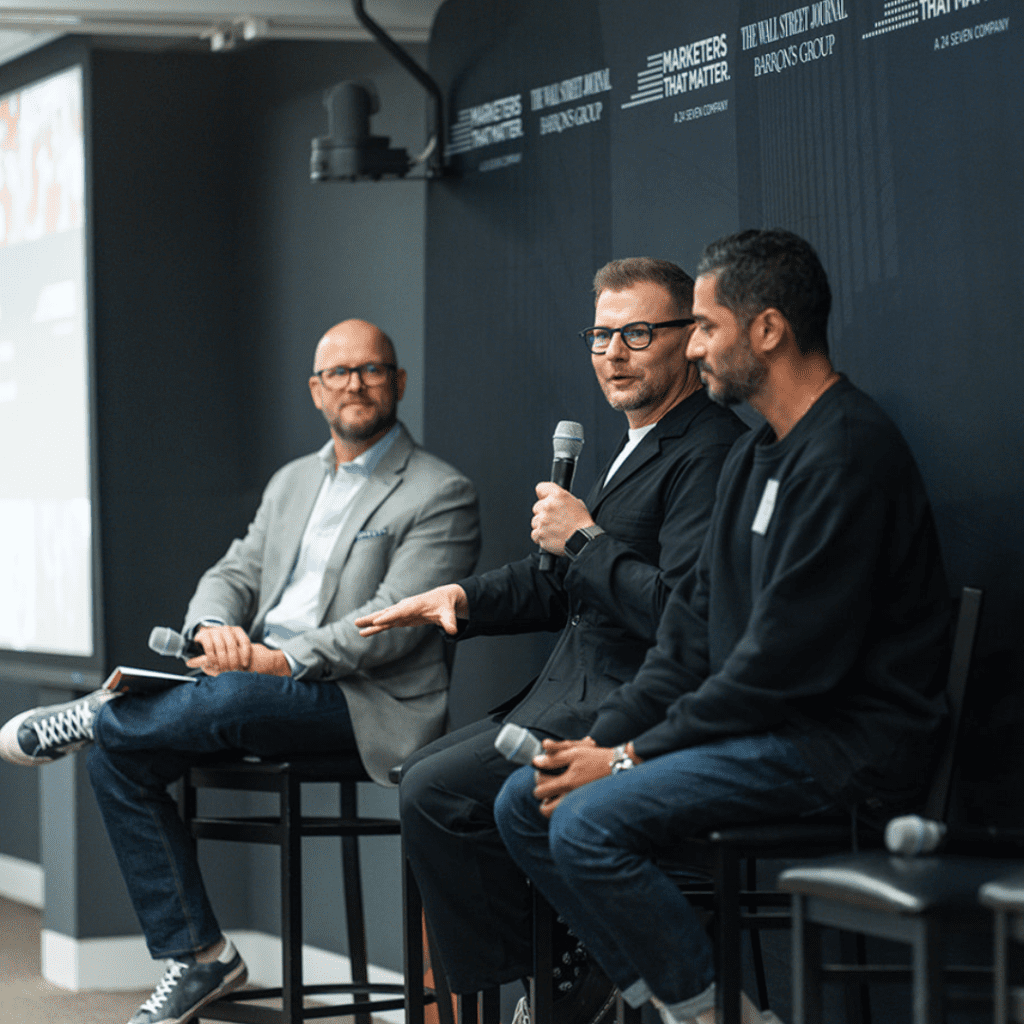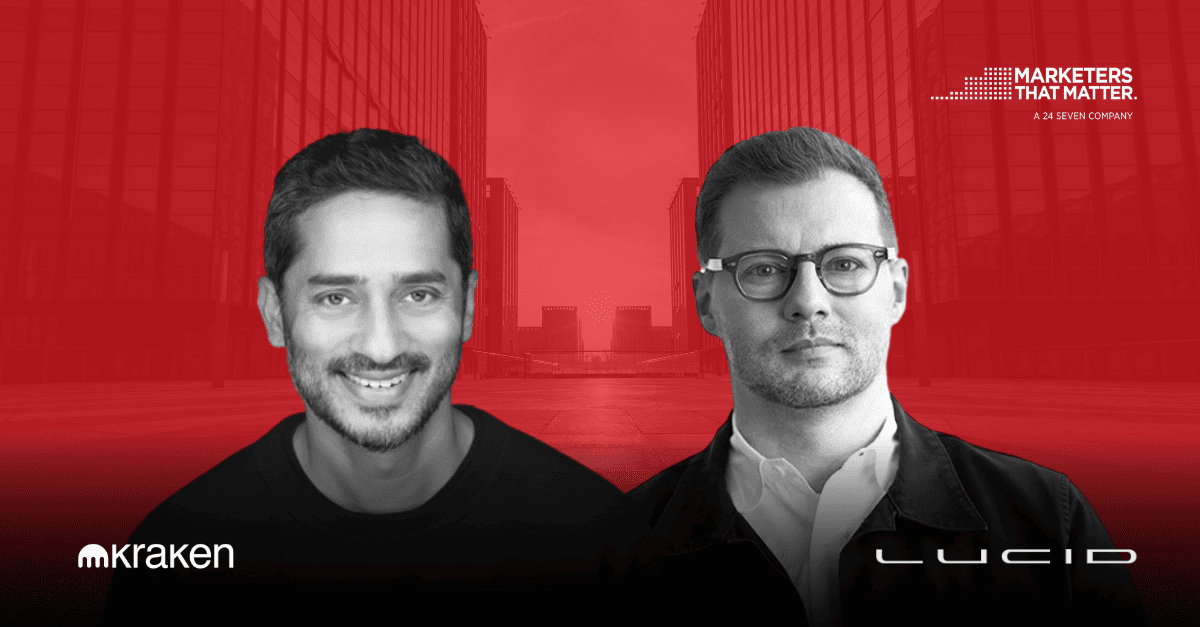In an age when technology continues to advance at lightning speed, brands that were unthinkable a decade ago are now available on the market – but how do you build brands in new spaces, channels, and worlds and establish consumer trust at the same time?
At the Marketers That Matter Summit held at the NFL Headquarters in NYC, moderator David Chivers, Head of Audience at Dow Jones, led a panel discussion on “New Spaces, Channels, and Worlds” with two top innovators leading disruptive brands.

Jeff Curry is VP of Global Marketing and Communications at Lucid Motors, a luxury EV brand that brought the Lucid Air, the first electric vehicle to breach 500 miles of range, and all the luxuries of the hottest elite vehicles to market.
Mayur Gupta is the CMO at Kraken, one of the world’s largest global digital asset platforms that is trusted by over 10 million traders and institutions.
Here is what they had to say at the NYC MTM Summit, and how it could impact your team, talent, and future.
Overview:
- Marketing with Awareness, Education, and Engagement
- Sustainability As the Forethought, Not Afterthought
- Learnings From The Journey
- Key Takeaways
Marketing With Awareness, Education, and Engagement
How has industry disruption and transformation changed how marketing interacts with consumers, and how do you think about this within your organization?
Jeff Curry: Everything we do comes down to authentic storytelling. With our stories, we strive to reach the early adopters who will tell people about our product.
We treat them as community members, inviting them in, showing them the latest technology, and giving them the software updates first.
At our core, we’re a tech company run by an engineer, so I put the engineers up front and let them tell their stories (To hear more about how Lucid is disrupting marketing and media models, check out his episode on Visionaries).
From the start, we’ve considered ourselves a luxury brand, and that’s the engagement we are building. There is no electric vehicle market; there’s a car market – our job is to convince buyers that an electric vehicle is a better choice. It’s critical that we spend a lot of time educating buyers on the technical nature and inherent goodness of the product and engaging our fans on social media at every point.
Mayur Gupta: From a marketing standpoint, building awareness about Kraken starts with education.
People don’t understand what crypto does; the perception is that it’s just a get-rich-quick game.
We must be empathetic about what people are missing from their lives, spread awareness, and present our technology as the solution.
Cryptocurrency is:
- Borderless: You can send and receive cryptocurrency from anywhere in the world.
- Durable: Cryptocurrency can be used over and over again without degrading.
- Irreversible: Transactions cannot be reversed and units cannot be spent twice.
- Permissionless: You do not need to provide information, nor permission, to create a wallet and own a cryptocurrency.
- Pseudonymous: No personal names or identifying information needs to be attached to the transactions.
(What is cryptocurrency? | Kraken)
With previous technological revolutions, such as with Uber and the iPhone, the technology was hidden because the value was visible. In crypto, we need to hide the technology and demonstrate its value. That’s when it drives global adoption, and we start to see the change. We’re at an inflection point where the value of the technology will become much more visible to the end user. Early adopters must become advocates—that’s how you drive change.
Sustainability As the Forethought, Not Afterthought
Consumers increasingly prioritize sustainability when evaluating where to shop and what to buy. As a result, brands need to find ways to implement and promote sustainable business practices. How are you thinking about sustainability, and how is that reflected in your brand and its culture?
Jeff Curry: With electric vehicles, sustainability may seem obvious: you’re using electricity instead of fossil fuels. But it needs to go much deeper than that.
What products are you using to make the vehicles? Are you using materials with high levels of recycled content? Is your leather produced in a carbon-neutral way? How can you ensure that the batteries and other technological components are sourced sustainably?
You need to think about it systematically and across every part of the company, and it has to be in the core DNA.
Our mission is to advance and accelerate the adoption of the best sustainable transportation in the world; this is the foundation of our company culture, from development to marketing to distribution.
Mayur Gupta: Crypto went in with a solution when the world was still searching for the problem, so we have to start with awareness about the problem we’re trying to solve.
We’ve all been trained to believe in the traditional financial ecosystem and don’t see the challenges and problems it causes.
Crypto technology offers solutions [to fiat money’s carbon footprint]; however, there are many misconceptions about it, primarily due to how mining is done.
As marketers, we aim to move away from the rhetoric and towards data to prove that crypto truly has power.
Although cryptocurrency is still being refined, it is better than our traditional financial system. As a society, we do not have a clear understanding of the foundation of money.
How much energy is consumed by our current financial systems, even from buildings and lights? As storytellers, we aim to demonstrate these stories and facts and show how crypto is much more sustainable. So we’re investing in editorial content and sustainability – energy consumption being one of them – with the hope of educating the world that the solutions crypto offers are much better than where we are.
Learnings from the Journey
What are some quick tips you can share from your journeys that other organizations can leverage?
Mayur Gupta: Perhaps more than every other function in the C-suite, marketing has been completely disrupted in the past decade. But as long as we can prove impact on the business, connect the brand with business, purpose with profitability, and science with storytelling, we’ll always be relevant.
Jeff Curry: We must find the right people and recruit for mindset. Not everyone is up for the challenge of a startup and the pressures that come with that, but some people are ready for the fight. There is no one way “working at a startup” should look. People of all ages and experience levels can bring value to the table.
Key Takeaways
Introducing new spaces, channels, and worlds to consumers to believe in and invest in your brand requires much persistence, patience, and determination. You must create awareness and cultivate enthusiasm for new outside-of-the-box products. Capitalize on the power of early adopters to promote your business and treat them as key players.
If people lack understanding about your product and its value to society, educate them and show them how it represents the future. As society pushes for sustainability, it is also essential to integrate these values and practices within the core principles that define your organization and industry. With the power of marketing and the determination to fight, even the most obscure new industries can flourish.
___________________________________
Moderated by David Chivers, Head of Audience at Dow Jones: David Chivers is a digital and data-fluent C-suite executive, general manager, consultant, advisor, board member, and coach. He helps brands, organizations, and people accelerate innovation and transformation for growth in B2C, B2B, and hybrid marketplaces. David has thorough experience leading turnarounds, global expansions, and growth strategies for institutions in the Americas, Europe, and Asia. He is known for driving top & bottom-line growth in large corporate and mid-size business environments.
Jeff Curry, VP of Global Marketing and Communications, Lucid Motors: Jeff Curry has been the VP of Marketing and Communications at Lucid, a new Luxury Electric Vehicle (EV) company, for the last three years. His brand is in the market to build the world’s most advanced EVs, starting with the Lucid Air. Jeff has spent most of his career in the auto industry working with legacy brands, like Audi, Ferrari, Jaguar, and Land Rover, as well as with luxury, technology, and media brands. He is an award-winning marketer and entrepreneur and excels in leading brands during transformative periods to create maximum growth.
Mayur Gupta, CMO, Kraken: Mayur joins Kraken from Gannett, part of the USA Today Network, where he led a team of strategists, brand marketers and data scientists to drive the company’s transformation from a news media platform to a digital content subscription marketplace. Prior to that, Mayur held key marketing leadership roles at Freshly, Spotify, Healthgrades, Kimberly Clark and SapientNitro. At Spotify, he drove the vision and strategy to establish a connected marketing ecosystem for Spotify’s 2-sided marketplace that connects artists with users through programmatic discovery and accessibility. Mayur was also the first ever Global Chief Marketing Technologist at Kimberly Clark, one of the largest global consumer packaged goods companies. Throughout his career, Mayur has been recognized for his achievements within the marketing ecosystem by Forbes, Harvard Business Review (HBR), The Economist and more. Mayur currently sits on the MMA Board of Directors, a marketing trade association that brings together the full ecosystem of marketers, martech and media companies working collaboratively to architect the future of marketing
Marketers That Matter® is a community of top marketing executives coming together to pioneer the future of marketing, sharing real-time experiences, and solving current challenges.
Our parent company, 24 Seven, specializes in helping you find exceptional marketing and creative talent for your teams.


